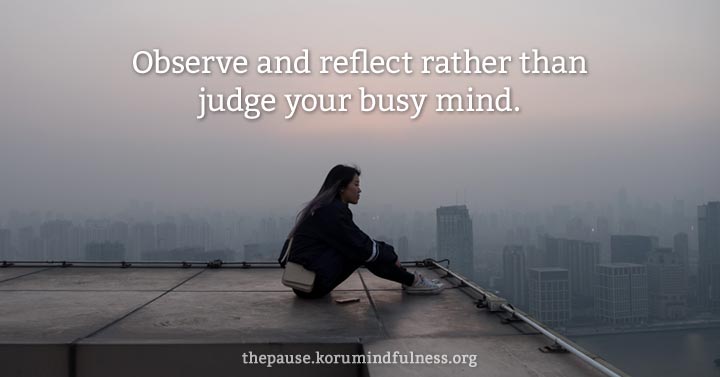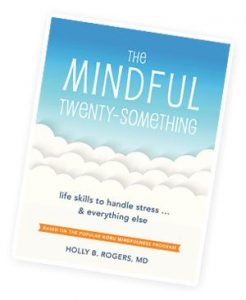
“My meditation was bad today. I can’t focus. My mind is just too busy.”
This comment about a busy mind, or some version of it, is by far the most common complaint I see written on my students’ meditation logs.
Usually, these new meditators view this trouble focusing as a problem. Often they see it as a problem of such magnitude that it either means they are completely incapable of meditating or at the very least, of experiencing any benefit from meditation.
First step: Redefining the problem

Though it seems like a problem, in truth, having a mind that hops around like a rabbit on a carrot hunt is not a problem. It is the usual state of mind for most of us.
The actual “problem” is that the busy-minded meditator has the idea that this is a problem. You feel like your mind should be doing something else, something different, something better.
To paraphrase Ajan Sumedho, the problem arises from the way you use language to take a position (I don’t like it), rather than for reflection (It is like this).
By “taking a position” I mean forming an opinion or judgment that you believe to be “true”.
By “reflection”, I mean using language as a mirror to reflect your experience in the minute.
What would it look like to use language for reflection when you are trying to meditate and your mind is very active and busy?
Notice that all this noticing has a quality of curious observation rather than struggle. You are simply observing what is happening in the moment instead of trying to change it or take a position on it.
Finally, you bring your attention back to your anchor to the present moment, whether that be the feeling of your breath, or the sounds around you.
Train your mind to suffer less
It is as common as mud for your mind to wander when you sit down to meditate. And it is just as common to then assess your mind as falling short in some way for doing this. Using your meditation practice, you can train your mind to reflect on your experience of mind-wandering (My mind is active), rather than take a position on it. (It’s bad. It’s a problem.)
No matter what thought passes through your mind or feeling passes through your body, you can reflect on it, rather than take a position on it.
You may ask, “Why do I want to do that?” An excellent question with lots of good answers. Here’s a couple.
One reason is that if you think your wandering mind is the problem, you will waste time trying to solve the wrong problem. By the way, “forcing” yourself to concentrate better never works.
Another reason is that you will feel better and treat others with more kindness if you train your mind to be even a bit more reflective.
But, I need my judgments
Right about now is when my students start to protest. They will say, “But I need to be able to have judgments and opinions.”
True and I agree. Of course you need to be able to make judgments.
I’m not taking the position that it is bad to take a position. But you also need to develop the ability to reflect and observe.
Frankly, most of us don’t need any more practice forming judgments. That ability is over developed and super strong, like this:

Judgments constantly flow through our minds. (I like this. I don’t like that. She’s good. He’s bad. You shouldn’t do that.) We are awesome at judging.
The other ability, the ability to observe and reflect, is under developed and pretty weak, like this:

If I were you, I wouldn’t waste too much time worrying that your baby reflecting mind is going to completely overthrow the strongman of judgment who lives in your head.
Instead, I’d take a seat and spend a few minutes (or more) meditating. It’s time to bulk up that baby!
Need help meditating? Download the Koru Mindfulness app and use our guided meditations.
Have questions or comments about working with your busy mind during meditation? Please share them below .
Photo by Adi Constantin on Unsplash
Get our latest articles in your inbox.

Just 8 weeks of meditation decreases activity in the right amygdala, which is associated with a better stress response.. Mindfulness doesn’t just make us feel less stressed, it’s also linked to lower levels of cortisol (the stress hormone).